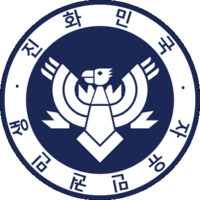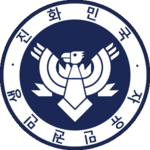Government of Zhenia
This article is incomplete because it is pending further input from participants, or it is a work-in-progress by one author. Please comment on this article's talk page to share your input, comments and questions. Note: To contribute to this article, you may need to seek help from the author(s) of this page. |
| Government of the Republic of Zhenia | |
|---|---|
| 진화민국 정부 | |
 Emblem of the Government of Zhenia. | |
| Overview | |
| Established | 1 January 2018 |
| State | |
| Leader | Premier |
| Appointed by | Chancellor |
| Main organ | National Council |
| Ministries | See Ministries |
| Responsible to | Parliament of Zhenia |
| Annual budget | $4.817 trillion |
| Headquarters | Capital District, Daedo, Zhenia |
| Website | www.zhen.gov |
 |
|---|
| This article is part of a series on the politics and government of Zhenia |
The Government of the Republic of Zhenia (Zhenian: 진화민국 정부), or commonly the Government of Zhenia (Zhenian: 진국정부) or even the Republic Government ((Zhenian: 민국정부), is the executive branch of the government of Zhenia. Constituted by the appointments of the Chancellor and subject to the confidence of both branches of the Parliament, it is primarily led by the Premier, as well as ministers of respective governmental departments and their deputies, who exert control over existing ministries.
Its existence justified by the Constitution, the government of Zhenia is normally led by the Premier, although the Chancellor, who retains the right of appointment as head of state, can exert control over the government in certain situations. The Premier, alongside ministers and deputy ministers of governmental departments, belong to the National Council, the highest committee in the government making decisions. Normally serving the same term as the Premier, all ministers and members of government can at least theoretically be subject to votes of no no confidence from the Sangseowon.
Overview
Current Government
Composition and structure
National Council
Functions
Ministries
The Government of Zhenia is organized into multiple ministries, separated by their own fields of responsibility and expertise. Each ministry is headed by a Minister, who is appointed by the Chancellor and report to the Premier, and supported by a deputy minister; some ministries also have affiliated agencies that report to both the Premier and the affiliated ministry. Although the necessity of such ministries in government is held sacrosanct by law, each individual government retains the right to change the name, function and structure of said ministries under the precondition that such changes are within the realm of the law and the constitution.
Ministers of the government's ministries can assume the position of Premier as listed below, in case the Premier cannot perform his duty and the Chancellor cannot assume the position of Premier. The Minister of the Interior and the Minister of the Economy and Finance are particularly assigned Vice Premier roles to assist and possibly assume the role of Premier; if this is not the case, the Chancellor retains the right to nominate any of the remaining ministers to assume the roles of Premier in the order disclosed below.
- Ministry of the Interior
- Ministry of Economy and Finance
- Ministry of Education, Science and Technology
- Ministry of Justice
- Ministry of Foreign Affairs and Trade
- Ministry of Defense
- Ministry of Health and Welfare
- Ministry of the Environment
- Ministry of Energy
- Ministry of Employment and Labor
- Ministry of Territories and Transportation
- Ministry of Agriculture, Food and Rural Affairs
- Ministry of Industry and Resources
- Ministry of Culture, Tourism and Sports
Independent Agencies
Although some agencies are under the command of the Premier, who is the chief of the executive branch, the Chancellor retains control over some governmental agencies that directly report to the Chancellor:
